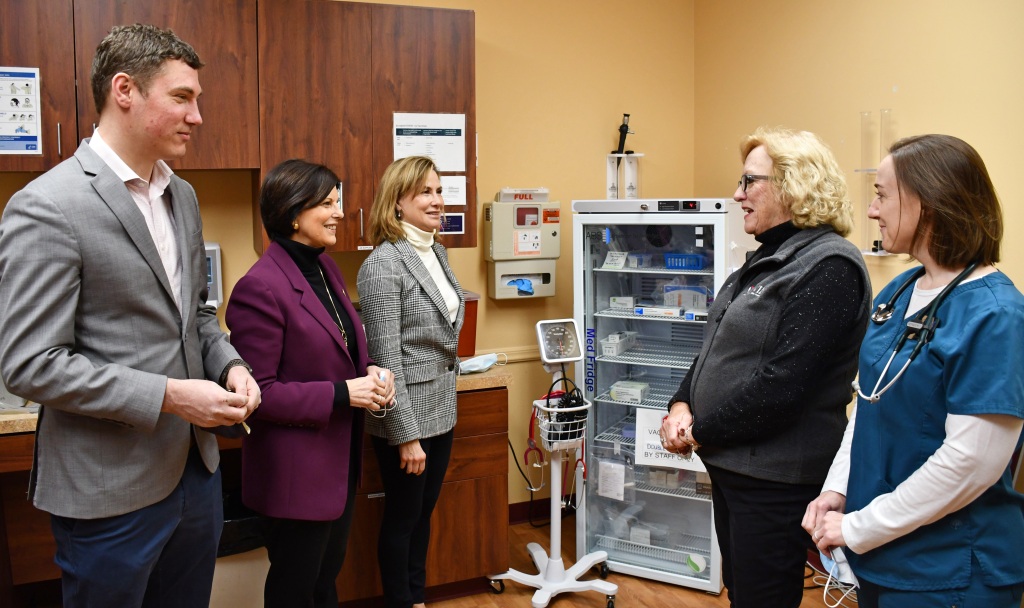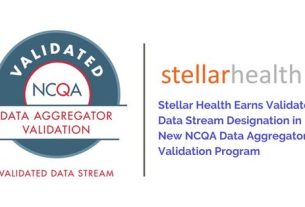[ad_1]

Chester County Commissioners Josh Maxwell, Marian Moskowitz, and Michelle Kichline (left to right) meet with Community Volunteers in Medicine (CVIM) President and CEO Maureen Tomoschuk, and CVIM Medical Director Janet Jacapraro, MD, during a recent tour of the community health facility. CVIM is receiving $1.5 million in American Rescue Plan Act (ARPA) funds from Chester County government to expand access to medical and dental care and to extend immunization services. In total the County has awarded $22 million for health and wellness initiatives. (SUBMITTED PHOTO)
WEST CHESTER—Chester County has long been recognized as the healthiest county in Pennsylvania, in part because the county has had a longstanding commitment to protecting public health.
The Chester County Health Department is one of only seven in the commonwealth, and it was one of the first, established in 1968. These investments in public health proved beneficial during the pandemic, when the county had the lowest COVID infection and death rates in the region.
Last September, county officials began awarding grants to local organizations using federal funds from the American Rescue Plan Act (ARPA), which awarded the county approximately $100 million dollars in federal funding. Applications for the grants amounted to three times that, and the county’s application review committee – comprised of both county residents and county government staff – poured over every application, evaluating each one based on strict ARPA federal guidelines, before making recommendations to the County Commissioners for approval.
“American Rescue Plan Act funds are generational investments in our community,” said U.S. Rep. Chrissy Houlahan, D-6th, of Easttown. “As our community’s federal representative, I’m proud to have voted for this vital legislation and I’m greatly encouraged to see this federal funding put to good use in our community. Make no mistake, lives and livelihoods will improve because of ARPA and I commend the Chester County commissioners on their selections and congratulate the organizations who receive these funds.”
Twenty-two million dollars in ARPA funds were allocated to organizations that focus on public health and behavioral health.
“It was a major priority for us to invest heavily in the health of our residents, especially in light of what we learned from the COVID pandemic,” said commissioners’ Chairwoman Marian Moskowitz. “Healthcare providers, particularly early on in the pandemic, were simply overwhelmed, and it made clear where the gaps in the system were, and really helped guide us in our decision making on how to distribute these funds – to ensure that the most vulnerable among us are able to access the care they need.”
The ARPA funds dedicated to community health will be invested in a variety of initiatives, both public and private, that take a holistic approach to community health and seek to improve health outcomes in communities with fewer resources.
“Our ARPA selection committee worked really hard to identify approaches that looked at public health from a holistic perspective, including mental health care and factors like poverty and food and housing instability that can also contribute to negative health outcomes,” said Commissioner Josh Maxwell. “These funds will help institute new programs, but are also scaling up successful approaches already in use by community partners throughout Chester County. We wanted to be sure we were investing this money as wisely as we could, and we’re very proud of what these investments will achieve.”
Commissioner Michelle Kichline said that a significant portion of the ARPA funds will be dedicated to expanding access to behavioral healthcare countywide. “There are many lessons learned from the pandemic, and one of them is to place even greater importance in recognizing and addressing mental health needs as much as we do our physical health needs. The ARPA funds are allowing us to invest in a new, comprehensive mental healthcare system that would have been cost-prohibitive otherwise.”
Creation of behavioral health crisis system
“I think the starting point is that the mental and behavioral health needs have skyrocketed, particularly through the pandemic,” said Jason Alexander, co-founder of Capacity for Change, a consulting firm that is working with the county on expanding access to mental health resources. “So the challenges that the County departments face in bringing about a better system is there’s overwhelming need.”
The county convened approximately 50 stakeholders from across sectors to provide input on what needs exist, and how best to meet them. The resulting plan, which will be paid for with ARPA funds, will have two main elements. The first is creating a county-led behavioral crisis center that will enable all local residents to have 24/7 access to mental health services via phone, text, or chat.
The county will also establish mobile behavioral crisis response teams that can be dispatched throughout the county on a constant basis, and will work closely with law enforcement, first responders, schools, and other organizations throughout the county to identify people in crisis and meet them where they are to get them the care they need.
“That’s going to be really a revolutionary transformational part of the system,” said Alexander. “What it will do is significantly decrease the number of times that either law enforcement has to respond to a mental health crisis, or that people with a mental health crisis will appear in our emergency departments, when they don’t have a physical health crisis, but they have a mental health crisis. It’ll drive down the burden on law enforcement, and our hospital systems who are meeting those crisis needs but aren’t really prepared, trained, or funded to do that. And that will ultimately benefit everyone, because our systems will be more effectively meeting the needs they’re supposed to.”
In addition to the new county programs, the funds will be going to nonprofits who have been working to improve community health, enabling them to expand their offerings and scale up existing programs to better meet the needs of the communities they serve.
A partnership between 2Fish Community Cafe and the Melton Center will enable them to not only improve and scale up existing programs, but also to expand into new areas. They began delivering charitable meals to people in need during COVID, but they now offer free, healthy dinners at the Melton Center in West Chester once a week, where community members not only get to share a meal, but also get access to Chester County Hospital’s health and wellness classes and checkups which can help them improve their overall health.
“Offering a complimentary, homemade meal in a community setting before the health and wellness presentation is an added incentive which encourages people to attend,” said Lisa Morris, executive director of 2Fish. “Youth culinary training and workforce development were existing programs, but with this funding we can now afford to hire a full-time chef who will help us expand all of our food-related activities including our community cafe, our charitable meal program, and our culinary training.
“We just think that this is a wonderful opportunity, and we’re so grateful to the county for just believing in us,” added Morris. “We’re really appreciative of the support that we have received from the commissioners, other public officials and the community.”
The Coatesville Center for Community Health (CCCH) will be using ARPA funds to launch their GRANDfamilies Initiative, the first such program in the county. The program will support grandparents who find themselves unexpectedly raising young children – especially those living with low or fixed income – who need access to resources tailored to their situation and support to raise the next generation. In 2022, the program supported 56 families in Coatesville. With the increased funding via ARPA, they expect to serve 90 families in 2023.
Reaching families in poverty
“Everything we do, we have in mind how we can stabilize and support people, so that they can raise healthy families that will be productive and add value to the County,” said Kathryn Spurlock, executive director of CCCH. “We’re trying to empower vulnerable families that are in poverty, and that often face inequitable situations. By keeping children with their family members, we can help to keep them out of the foster care system. This results in a cost savings to the taxpayer and a better outcome for the family. We are very proud of the growing positive impact of the GRAND families Initiative on the well-being of families in need.”
The Parkesburg POINT will be using its share of ARPA funds to expand their already popular services that have been oversubscribed, including sports and wellness initiatives, and access to free healthy meals.
“We have around 650 registered students, and in a given week, we’re going to have anywhere between 250 to 300 different students coming through. And more than that on the weekend, so we are addressing a need in the county, especially among the kids who have really, really been historically underserved,” said Dwayne Walton, executive director of the organization. “Our numbers from 2019, right before the pandemic, to 2022, increased by 50 percent. This ARPA grant will help to fund four new positions that we developed in response to COVID and enable us to better meet the needs of the kids we serve.”
The Clinic in Phoenixville will use ARPA money to go beyond physical medical help and launch the Phoenixville Community Behavioral Health Program in 2023. A behavioral health program manager and social worker will serve patients in need to promote overall mental health and wellness as well as pre-empt mental health crises, an approach geared toward preventing the most serious outcomes including suicides and the need for inpatient facility treatment.
“Behavioral and mental health is a huge issue not just in this region, but across the country right now,” said Christi Seidel, executive director of the clinic. “Our goal is to help people get through whatever the immediate crisis is before they end up in a much worse situation. And it’s very challenging for people to find behavioral health support, especially if English is not your first language, which is the case for about 60% of our clients. And we serve a lot of people that have trauma. Sowe’re here to help support them through that.”
Community Volunteers in Medicine (CVIM) serves low-income, uninsured individuals who live and work in the county who have no access to health care. It provides primary care service, specialty care services, access to medication, as well as dental services including oral hygiene care, all under one roof with the goal of keeping people well so they are able to work and support their families — and out of the local emergency rooms.
“Everyone suffers when the emergency room is being over utilized by people who really just need primary care or specialty care, and so our goal has always been to make that a priority here. We also focus on wellness, disease prevention, and teaching people by giving them the tools they need to take care of their own health conditions,” said Maureen Tomoschuk, president and CEO. “The ARPA funding is really helping support our model as well as increasing access to care.”
[ad_2]
Source link


